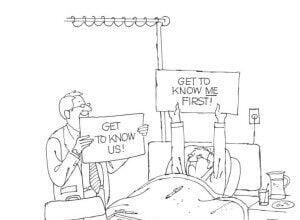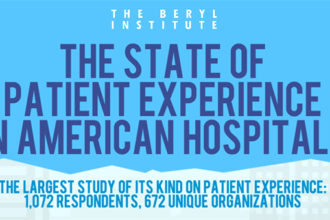 When I was in medical school training to become a radiologist, I anticipated the long, irregular hours, the difficulty of making a grim diagnosis, and, of course, the deep satisfaction that comes from helping people. What I did not anticipate was the endless mountain of headache-inducing paperwork that would consume nearly a quarter of my time at work each and every day.
When I was in medical school training to become a radiologist, I anticipated the long, irregular hours, the difficulty of making a grim diagnosis, and, of course, the deep satisfaction that comes from helping people. What I did not anticipate was the endless mountain of headache-inducing paperwork that would consume nearly a quarter of my time at work each and every day.
 When I was in medical school training to become a radiologist, I anticipated the long, irregular hours, the difficulty of making a grim diagnosis, and, of course, the deep satisfaction that comes from helping people. What I did not anticipate was the endless mountain of headache-inducing paperwork that would consume nearly a quarter of my time at work each and every day.
When I was in medical school training to become a radiologist, I anticipated the long, irregular hours, the difficulty of making a grim diagnosis, and, of course, the deep satisfaction that comes from helping people. What I did not anticipate was the endless mountain of headache-inducing paperwork that would consume nearly a quarter of my time at work each and every day.
Not only does paperwork drive up healthcare costs and rob patients of face time with their physicians, but it also takes away time that could be spent honing our skills and actually doing what we’re good at: serving, healing, and helping people.
The True Cost of Paperwork in Healthcare
Filing mounds of paperwork takes away from our true purpose at work and makes every aspect of practicing medicine less efficient and less effective. The majority of problems that arise in medical facilities concern documenting medical histories, prescriptions, and payment services —administrative tasks that must be completed for each and every patient.
And it’s not limited to just hospitals. As a radiologist working at a health clinic, I interpret radiographic findings and render conclusions. Following that, I spend a significant portion of my time adding an exhaustive amount of information to the reports to satisfy medical regulations.
COL Wallace Brucker, one of my peers, shared similar frustrations when he returned to civilian medical practice after 14 years as a physician in the Medical Corps.
“Medicine seemingly took a backseat to the more mundane struggles of medical practice,” he said of his civilian career. “I felt no escape from the nearly constant battle with insurance companies and bureaucracies for timely payment on services already rendered. Hours were spent on resubmission of documents or pre-certification for vital interventions.”
Extra paperwork and administrative tasks are not just nuisances. The Texas Medical Association, which represents more than 47,000 physicians and medical students, reports that physicians spend around $83,000 on administrative costs alone. In the United States, the cost of healthcare is higher than in other countries for almost every area; administrative costs average about $900 per person each year, compared to $300 per person in France. The use of technology in other countries cuts down on paperwork from the doctor to the pharmacist, which can save a pharmacist up to two hours of work each day.
What’s Lost When Red Tape Gets in the Way
When we are overwhelmed with regulatory issues, skills and performance suffer. We lose time that could be spent helping patients, time that could be devoted to researching new techniques and procedures, and an overall focus on medicine.
Around 25 percent of my daily time is stacked with regulatory compliance tasks, rather than attending directly to a patient’s diagnosis or care. Bureaucratic distractions that divert attention to the processes associated with each patient (rather than the patient himself) result in excessive administrative costs and a weakened medical industry. Even more frustrating is the fact that those in leadership roles cannot do much to improve their situations because medical agencies are in control.
If agencies were to consolidate, physicians and their practices or hospitals would only have to deal with that one conglomerate. This would mean only one agency influencing business regulation practices within the facility.
What Can We Do About It?
Although there are ways to manage the paperwork — such as hiring efficient office managers — a guaranteed solution to the overarching problem isn’t clear yet. However, there are still ways to make sure we don’t lose our focus on what really matters: the patient. Medical groups and legislators are taking steps to streamline the healthcare industry.
Some physicians believe this issue can be solved from the top down by taking political action. Physicians at some facilities are encouraged to run for local political positions and leadership roles to influence and encourage change with medical regulations. Many physicians create local campaigns or simply educate their practices on compliance issues.
Some states are already taking legislative action to improve efficiency. In Texas and Michigan, several bills are in the works to eliminate paperwork by obtaining information from patients’ driver’s licenses, streamline processes by standardizing all health service plans, and even consolidate insurance coverage information to a single document. I am optimistic that these changes have the potential to improve the quality of care and increase the amount of attention we can devote to each patient.
In my clinic, we deal with insurance companies’ standards tirelessly, but during my time in the service, I realized that the military is far less burdened with regulatory paperwork than civilian medical providers. This made my job much more enjoyable, improved the quality of patient care, and gave me hope that it’s possible to get away from those tasks in the civilian medical sector.
As medical professionals, we should strive to care for our patients and focus on their health instead of fulfilling our duties to insurance companies and national regulatory commissions. Although some paperwork is needed to document what’s best for each and every patient, we all must understand the patient is the priority. If we want to improve the field of medicine, a change must be made. That stack of paper isn’t just a time killer; it’s an industry killer.
(red tape / shutterstock)








